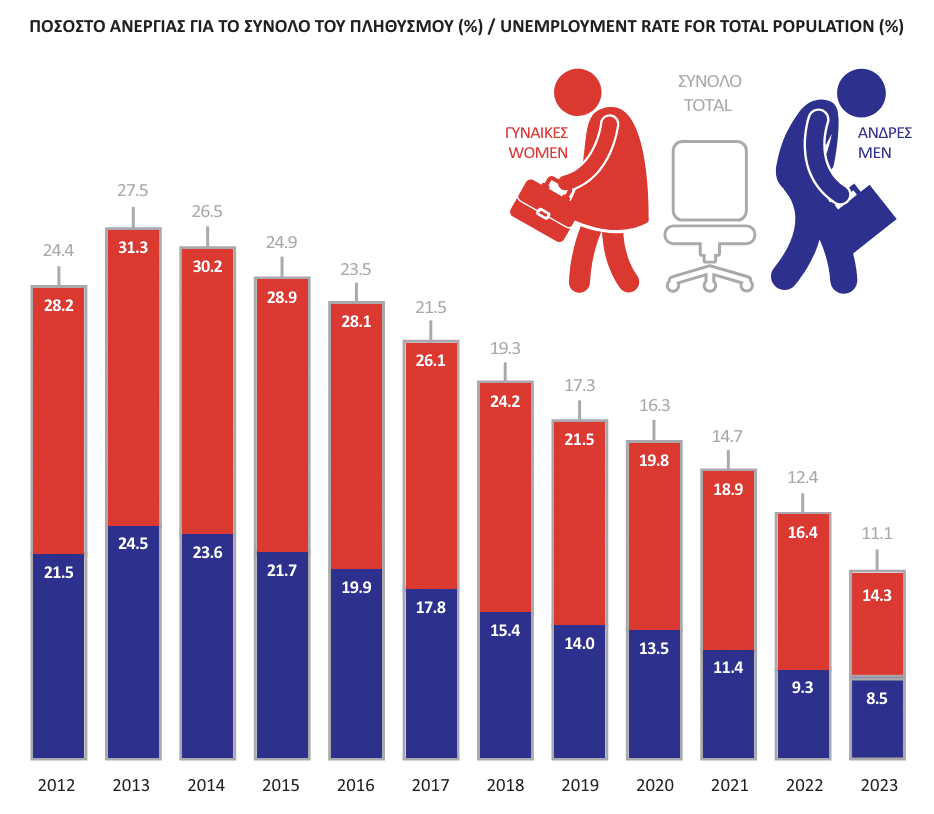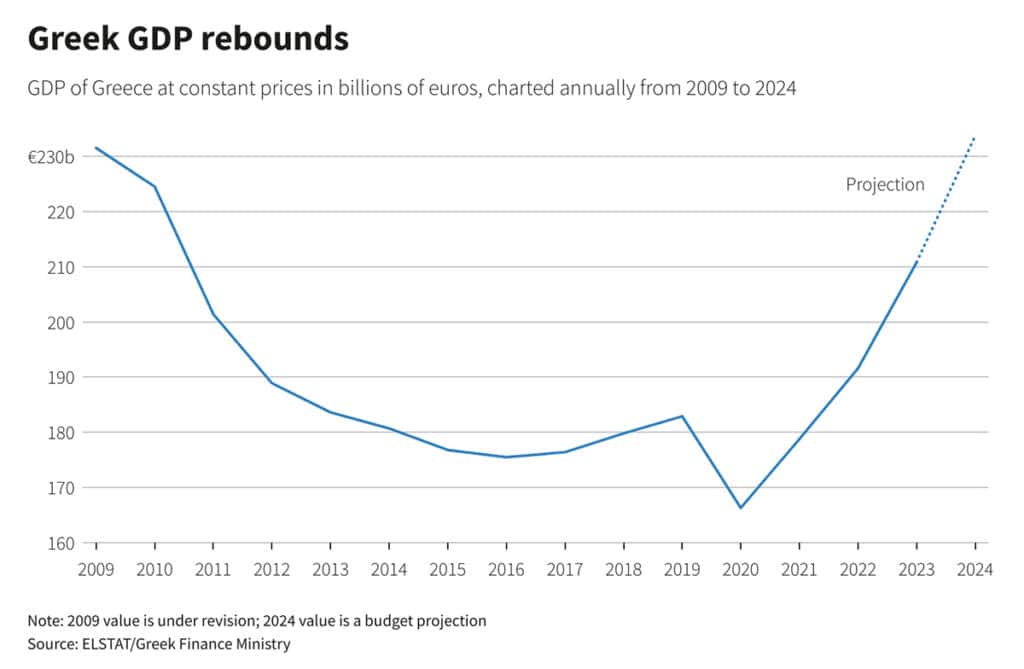Volcanoes are erupting in The Philippines, but on-fire Australia received some welcome rain. The Iran war cries have been called off and The Donald’s military powers are about to be hamstrung by the Senate. Meanwhile, his impeachment trial is starting, and we’re all on Twitter for a front-row seat.
What Could Go Right? Exiting the Grexit Era
The worst of Greece’s economic pain is finally behind it.
This is our weekly newsletter, What Could Go Right? Sign up here to receive it in your inbox every Thursday at 5am ET. You can read past issues here.
Exiting the Grexit Era
Before Brexit actually happened, Grexit almost did.
Many readers will remember how close Greece came to exiting the eurozone at the height of its decade-long financial crisis that began in 2009.
The situation was so precarious in the summer of 2015 that all the country’s banks were closed in order to prevent a run. This was after negotiations between Greece and its creditors broke down when the then-leftist government skipped a loan payment and subsequently held a national referendum on bailout conditions. At that time, many wondered if Grexit would lead to the end of the entire eurozone project.
Contrast that with today. Instead of the eurozone, Greece exited its bailout program in 2018, and paid off its entire debt of 28 billion euro to the International Monetary Fund (IMF) in 2022, two years early.
That same year, Greece reached male single-digit unemployment for the first time since the crisis. It’s still one of the highest unemployment rates in the European Union, but it’s down from a peak of almost 30 percent and continues to drop for both men and women. (Substacker The Greek Analyst writes a little here on why this is such a significant marker for Greece.)

Ratings agencies returned Greece to “investment grade” in 2023—a shorthand for the probability of investors to get their money back—after being graded as “junk status” since 2010, meaning that the country can once again access financial markets.
And despite summer heatwaves and wildfires, record numbers of tourists have vacationed in Greece post-pandemic. In 2024, Greece’s GDP is finally forecast to return near its pre-crisis size, reports Reuters.

Politics has also stabilized. The neo-Nazi political party Golden Dawn, whose star rose during the unrest of the financial crisis years, has since collapsed, its leaders convicted of running a criminal organization. The party lost all of its parliament seats in 2019 and was dissolved shortly after.
All of this did not come without significant suffering for the Greek people, including the deeply unpopular austerity measures—severe budget cuts, including to pensions, as well as tax reform—voters had rejected in the 2015 referendum. Others will argue that they were a painful but necessary corrective, however, after years of irresponsible government spending.
I live in Athens, and if you talk to everyday people about Greece heading in a positive economic direction, you’re likely to get the hairy eyeball in return. Many struggle with the cost of living. Airbnb has artificially inflated rents in tourist areas like Athens. Salaries are low, employees work in challenging conditions, and the public is highly conscious of inequality—one of the most viral videos of last summer was of a waiter on the island of Rhodes walking chest-deep into the sea in order to bring food to customers on floating beach beds.
Young people especially are disgruntled, and many still leave the country to seek better job opportunities. The short- and long-term economic outlook is not certain.
And yet today is a far cry from when Greece was in dire financial straits. With the worst finally behind it, the country has the opportunity now not only to recover, but also to thrive. As Progress Network Member Fareed Zakaria put it recently on CNN, the “sick man of Europe” has been cured.
What Could Go Right? S6 E2

Many news stories tend to focus on the doom and gloom of our current economy. Zachary and Emma speak with economist and author Allison Schrager, who tends to see things differently. Climbing wages, retirement planning, and even the current state of inflation are all positive elements of today’s economy. TikTok and the rise of younger generations living at home are also hot button topics in today’s conversation. | Listen now
By the Numbers
1 in 5: The number of cars sold this year worldwide that will be electric. (In 2020, it was one in 25.)
1 in 15: The number of fast-charging EV stations for every gas station in the United States. (Bloomberg $)
10: The percent of global GDP growth attributed to clean energy in 2023.
Quick Hits
🦭 The numbers of Finland’s Saimaa ringed seal, one of the most endangered seals, are rebounding after decades of conservation efforts. In the last 10 years, one technique in particular has been key: human-made snowdrifts, where the seals shelter and raise their pups and which have not been forming naturally as climate change turns snow to rain. (MIT $)
🍃 Last year was a record one for wind installation, with 117 gigawatts of new wind power capacity installed worldwide, a 50 percent increase from 2022.
🇻🇳 Vietnam, the world’s third-largest rice exporter, is testing ways to climate-proof and reduce the methane emissions of its rice paddies.
☀️ Germans who don’t own houses or can’t install rooftop solar are enthusiastic about “solar balconies”—solar power kits you can buy and install yourself.
🇯🇵 Until a recent change in law, Japanese couples going through a divorce had to decide which parent would take sole custody of their children. From 2026, couples will be allowed to negotiate joint custody.
⛔ The creation of sexually explicit deepfakes, regardless of whether they were created to be shared, is set to become a criminal offense in England and Wales. In response, two large deepfake porn websites are blocking visitors from the United Kingdom. (Wired $)
👏 America’s bridge infrastructure has improved over the last 20 years, with 15 percent of the nation’s bridges rated poor in 2000, but only 6.8 percent in 2023.
💯 Substacker Noah Smith on five things to be optimistic about in the US today: crime is going down, we’re making progress against climate change, the economy is growing fast, younger generations are doing better than their parents, and wage inequality is falling.
🇪🇬 A 3,400-year-old statue of King Ramses II was returned to Egypt after being smuggled out of the country more than 30 years ago. The artifact will be restored by the Egyptian Museum in Cairo.
👍 The World Health Organization’s Regional Director for Africa highlights several areas of progress for World Health Day in early April, including reductions in maternal and child mortality rates and the near-eradication of several diseases.
💉 One study has found that a single, low-dose injection of ketamine, administered immediately after childbirth, significantly reduced major depressive episodes in mothers with prenatal depression.
💊 Long-acting drugs for HIV treatment, which could replace the daily taking of a pill and could help solve issues around access, are on the horizon. (NYT $)
🔬 A drug called cyclophosphamide has quietly transformed the prospects of those in need of bone-marrow transplants, eliminating the need to find an exact match and opening up far more possibilities of a donor. (The Atlantic $)
📰 New York’s state budget includes a national first: tax breaks to hire local journalists.
🦟 Bed nets are an important component of preventing malaria cases, but mosquitoes have developed a resistance to the insecticide they are coated with. Pilot programs of second-generation nets, however, have been effective, already preventing an estimated 13 million cases.
👩 American businesses must now grant unpaid time off, when requested, for a worker after childbirth or abortion. Also, the Biden administration has ruled that HIPAA protections extend to abortion-related records, meaning that health care providers cannot “tell law enforcement about a patient’s abortion if they received the procedure in a state where it is legal, it is protected by federal law, or it is permitted by state law,” reports The 19th.
🚄 This week, construction began on the US’ first true high-speed rail line, which will connect Las Vegas to the Los Angeles suburbs. If the project can avoid the trap of delays and ballooning costs, it may signal the start of a high-rail landscape enjoyed by countries in Europe and Asia.
💡 Editor’s pick: We’re crying in millennial: Gen Z is unprecedentedly rich. (The Economist $)
TPN Member Originals
(Who are our Members? Get to know them.)
- How to be pro-Palestinian, pro-Israeli, and pro-Iranian | NYT ($) | Thomas L. Friedman
- The Kay Burley path to world peace | Nonzero | Robert Wright
- The small miracle that is Trump’s trial, and the challenge it poses to his authoritarian personality | Lucid | Ruth Ben-Ghiat
- Climate change and globalization | Cato Institute | Charles Kenny
- How to be less busy and more happy | The Atlantic ($) | Arthur C. Brooks
- We can do it! How our decisions can accelerate economic growth | Faster, Please! | James Pethokoukis
- What is progress? | The Roots of Progress | Jason Crawford
- The courage to follow the evidence on transgender care | NYT ($) | David Brooks
- What if O.J.’s trial happened now? | NYT ($) | John McWhorter
- War on the young | No Mercy/No Malice | Scott Galloway
- Election countdown: A civic example to follow | Breaking the News | James Fallows
- House passes foreign aid, TikTok bills | Tangle | Isaac Saul


